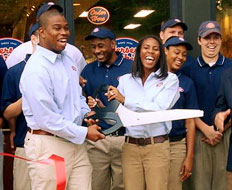Angelo Crowell is a big man. At 6 feet 1 inch tall and about 250 pounds, you might take the broad-shouldered 29-year-old for a football player.
You probably wouldn’t pin him as the perfect restaurant franchisee.
With the first presumption, you’d be right. Crowell played linebacker in the NFL for the Buffalo Bills, who drafted him in 2003, and later for the Tampa Bay Buccaneers. He is now a free agent who says he keeps himself in game shape in case he gets another opportunity to play.
“I’d rather be ready than not ready,” he says.
While Crowell says he hasn’t “closed the door” on the NFL, he has opened the door on a second career as a Jersey Mike’s Subs franchisee—several doors, actually, as Crowell’s third Florida location is scheduled to open in Tallahassee on May 4.
Crowell eyed the restaurant industry for years before buying an existing Jersey Mike’s in Tampa and then, last November, opening a new location in Tallahassee.
While he had shown an interest in business early in his football career, taking advantage of an NFL internship program that sent him to the Wharton School at the University of Pennsylvania for two weeks in 2006, Crowell got schooled on running a quick-service franchise through the Player Athlete Franchising Initiative (PAFI).
A partnership between Allied Athlete Group and the International Franchise Association, PAFI acts as a bridge between franchisors and professional athletes and operates on the theory that the latter are uniquely suited to the franchise model.
“On paper, athletes should make good franchisees,” says Stan Friedman, senior vice president of franchise management system FranConnect and chairman of the PAFI Franchise Advisory Board. “These are guys who have made it a career to follow orders and to be able to give orders.
“Franchising is about following a proven system and sticking with an operations plan that you didn’t have to create, but that you have to execute. Well, who does that better than a pro athlete?”
In other words, the franchisee-franchisor relationship has a lot in common with the player-coach relationship. If that makes the benefit to franchisors like Jersey Mike’s obvious, a 2009 Sports Illustrated article, “How (and Why) Athletes Go Broke,” makes it clear why Crowell and other athletes have a lot to gain from initiatives like PAFI that help them draw up a game plan for life after professional sports.
The article reports that two years after retirement, 78 percent of NFL players “have gone bankrupt or are under financial stress because of joblessness or divorce.”
It was this epidemic of post-career collapse that led former NFL cornerback Michael Stone to found PAFI last year.
“It’s a pretty big problem,” Stone says. “But it’s not a testament to athletes’ inability to manage businesses or handle finances.”
Stone attributes the high incidence of financial failure among retired pro athletes to the fact that many do not prepare for the end of their careers, an end that can come at any moment.
“Your average athlete makes between $250,000 and $350,000 a year for two and a half years,” Stone says. That is good money, “but when you retire after two and a half years, your earning years are far from over.”
That was something Crowell had in mind in the so-called “twilight years” of his NFL career.
“At any point the game can be over,” he says. “A lot of guys get in the position where they have a steady stream of income, and then the game stops, and they’re living off their savings. I think that’s what a lot of players fall into, and they run into a lot of financial problems. That’s something I wanted to try to avoid.”
The franchise model appealed to him because it drew on his training as a pro athlete.
“One thing I can do is execute a playbook,” he says.
After exploring several concepts, Crowell went with Jersey Mike’s because of his familiarity with the brand. “I grew up eating it,” he says. Now he and his wife own the development rights for Gainesville and Tallahassee, both potentially lucrative college markets.
Crowell is not the only football pro, current or former, who is getting into the restaurant-franchise business. New York Giants linebacker Gerris Wilkinson recently opened a Golden Corral after attending a PAFI summit, Stone says.
The signs indicate that more pro athletes will get into the quick-service business. PAFI’s 14 franchisor members include Jersey Mike’s, Moe’s Southwest Grill, Checkers Drive-In, East Coast Wings & Grill, and Dunkin’ Donuts, and Stone says he is trying to enroll 50 charter members by the end of 2011.
But even with PAFI actively helping pro athletes transition from the bright lights of the football stadium to the heat lamps of the quick-service kitchen, there is no guarantee they will succeed, despite their proven aptitude for executing a game plan.
“This is not for everybody,” Crowell says. “You have to do your due diligence, understand the model, [and] study how to get success. Just like football.”




